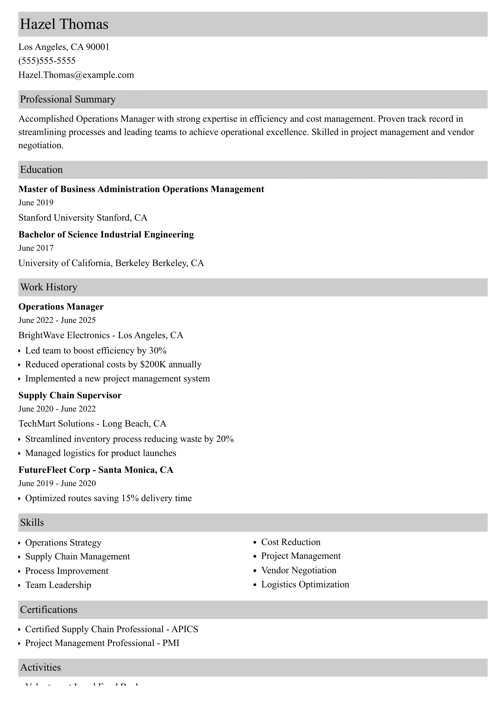As a student, you may find it challenging to fill up the experience section of your resume with relevant content. You even considered adding taming younger siblings to it, but your friends advised against it.
Fret not! Even though employers value previous work experience much, it’s not the only thing they’ll be looking at on your resume. Listing relevant coursework on a resume can give the recruiters a peek into the types of skills you’ve developed as a student, and effectively convince them you’re the person they’ve been looking for.
This article will show you:
- When you should (and shouldn’t) put relevant coursework on a resume.
- How to list relevant coursework on a resume for your benefit.
- Examples of relevant courses on a resume.
Want to save time and have your resume ready in 5 minutes? Try our AI resume builder. It’s fast and easy to use. Plus, you’ll get ready-made content to add with one click. See 20+ resume templates and create your resume here.
Sample resume made with our builder—See more resume samples here.
Looking for other resume writing resources? Check out our guides:
- How to Make a Resume
- What to Include in a Resume
- How to Put Your Education on a Resume
- How to Put Phi Beta Kappa on a Resume
- How to Put Athletics on a Resume
- Resume With No Experience
- College Student Resume
- High School Student Resume
- College Graduate Resume
- Undergraduate Resume
- Best Examples of Resumes for Any Job
1. What Does Relevant Coursework Mean and How to Include It on Your Resume
Relevant coursework is a list of subjects and courses you took at school that are pertinent to the position you're applying for. You can include relevant coursework on your resume in the education section. Any courses, subjects, and projects you list have to be related to the job opening.
This is a great addition to any entry-level resumes or student resumes alongside projects, academic achievements, extracurriculars, and volunteer experience. It may also come in handy on an internship resume when you want to show the recruiter the skills that make you a perfect fit.
That being said—
Listing relevant courses on a resume isn’t really necessary if you can show more than a year of experience on your resume.
If that’s the case, focus on tailoring your resume's job description section and consider including other resume sections.
And—
As the name suggests, relevant coursework should be... relevant. So, don’t force this section into a resume where adding coursework makes no sense.
At the end of the day, it’s what you can do that counts most, not the number of courses on a resume.
So, rather than populate your resume with fillers, focus on your skill set and put your skills in the spotlight.
Remember—
It’s relevant experience that truly matters.
Pro Tip: Look at the job offer to judge whether or not you should include relevant coursework on a resume. For example, if the employer requires you to put GPA on a resume chances are they’d be interested in your relevant courses as well.
Making a resume with our builder is incredibly simple. Follow our step-by-step guide, use ready-made content tailored to your job and have a resume ready in minutes.
When you’re done, our AI resume builder will score your resume and our resume checker will show you exactly how to improve it.
2. How to List Relevant Coursework on a Resume
Once you decide that relevant coursework should be on your resume, you might start wondering where to put courses on a resume.
Most of the time, relevant coursework is a subsection of your resume education section.
Depending on how much work experience you have, the education section might either come first on your resume or follow the experience section.
You can add relevant coursework to your resume in several ways:
1. Put relevant coursework on your resume in an additional line in your education section.
Relevant Coursework on Resume—Example
2016 BA in Psychology
UCLA, Los Angeles, CA
Relevant Coursework: Language and Cognitive Development, Psychology of Emotion, Psychological Statistics, Cognitive Linguistics
If you add the relevant courses to a resume in this way, you’ll have plenty of room for including other academic achievements on your resume.
2. List relevant coursework on your resume in bullet points to give it more prominence.
Relevant Coursework—Resume Example
2016 BA in Psychology
UCLA, Los Angeles, CA
Relevant Coursework:
- Language and Cognitive Development
- Psychology of Emotion
- Psychological Statistics
- Cognitive Linguistics
3. Finally, use detailed bullet points to explain the relevance of coursework to the position.
Relevant Courses on a Resume: Sample
2016 BA in Psychology
UCLA, Los Angeles, CA
Relevant Coursework:
- Language and Cognitive Development—wrote a semester paper on the influence of bilinguality on the perception of time and temporal relations
- Psychology of Emotion—explored the relation between language structures and human emotion
- Psychological Statistics—learned how to translate research results into statistically significant studies
- Cognitive Linguistics—analyzed semantic and grammatical aspects of language in the context of human cognitive abilities
If the candidate above applied for an SEO-related position all the coursework would be relevant.
In combination with some previous work experience (e.g. internship) and strong computer skills, their SEO resume would look very solid.
Finally—
If the position you’re pursuing requires strong academic background and credentials, you might want to consider allocating an entire resume section exclusively for your relevant coursework.
In such case, it would make sense to go for a bullet point, list and describe each course in detail.
3. Tips on Putting Relevant Courses on a Resume
When listing relevant coursework on a resume, remember:
- Always tailor your resume to the job offer. If the position requires a lot of relevant experience, putting relevant classes on a resume will not get you any points. In such cases, throw relevant coursework out of the window and focus on your skills.
- If your coursework is particularly relevant to the position, consider putting it closer to the top of your resume.
- If you decide to add relevant courses to your resume, it’s a good idea to include other relevant educational information as well (e.g. GPA scores, academic honors and awards, etc.).
- Think of the relevant coursework resume section as another opportunity to feed the ATS and include strong resume keywords to boost your chances.
- Don’t limit yourself to the coursework you did. Include the relevant academic projects and research to add value to your resume.
- If you completed some online courses, you’re free to list them as well.
- I said it before, but I’ll say it again: make sure that listing relevant coursework on your resume does make sense. Don’t put it there just to fill up white space. Relevance is key.
Pro Tip: Spend a lot of time editing your resume. Get rid of all typos and grammar errors. Make sure your punctuation is spotless and formatting is consistent throughout the entire document. Then read our guide on resume dos and don’ts.
Plus, a great cover letter that matches your resume will give you an advantage over other candidates. You can write it in our cover letter builder here. Here's what it may look like:
See more cover letter templates and start writing.
Key Takeaways
Here's all you need to know about putting relevant coursework on a resume:
- Listing relevant courses on a resume is optional.
- It makes sense to put relevant coursework on student and entry-level resumes.
- If you have at least one year of experience, drop relevant courses from your resume entirely, and focus on tailoring the job description and key skills sections.
- Use the education section to present the relevant coursework. You can provide either general or detailed information regarding the courses you took.
- Consider making a dedicated relevant coursework section if the position you're applying for requires strong academic background.
- Last but not least, remember that relevance is the keyword. So don't list coursework when applying for positions that don't require it.
About Zety’s Editorial Process
This article has been reviewed by our editorial team to make sure it follows Zety's editorial guidelines. We’re committed to sharing our expertise and giving you trustworthy career advice tailored to your needs. High-quality content is what brings over 40 million readers to our site every year. But we don't stop there. Our team conducts original research to understand the job market better, and we pride ourselves on being quoted by top universities and prime media outlets from around the world.


![How to List Relevant Coursework on a Resume [10+ Examples]](https://cdn-images.zety.com/pages/relevant-coursework-resume-ztus-cta-02.webp)


